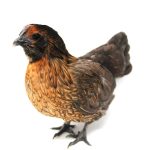When selecting chicken breeds for a backyard flock, several factors should be considered. Climate is a crucial element, as some breeds are better adapted to cold weather, while others thrive in warmer conditions. The intended purpose of the flock is also important; certain breeds are known for their egg-laying capabilities, while others are valued for meat production.
Temperament is another key consideration, with some breeds being more docile and friendly, and others more skittish or aggressive. Flock size and available space are additional factors to consider. Smaller breeds may be more suitable for limited spaces, while larger breeds can be appropriate for meat production if ample space is available.
Egg color preferences can also influence breed selection, as different breeds produce eggs in various colors, including white, brown, blue, and green. By carefully evaluating these factors, backyard chicken keepers can choose breeds that are well-suited to their specific needs, environment, and preferences, ensuring a successful and satisfying experience with their flock.
Table of Contents
- 1 Coop and Run Set-Up
- 2 Feeding and Watering
- 3 Daily Maintenance
- 4 Health and Safety
- 5 City Regulations and Permits
- 6 Community Engagement
- 7 FAQs
- 7.1 What are the benefits of keeping chickens in the city?
- 7.2 Are there any legal restrictions on keeping chickens in the city?
- 7.3 What are the space requirements for keeping chickens in the city?
- 7.4 What do city chickens eat?
- 7.5 How do you keep chickens safe from predators in the city?
- 7.6 How do you manage chicken waste in the city?
Key Takeaways
- Consider the climate, space, and purpose of raising chickens when choosing the right breeds for your coop
- Ensure the coop and run are secure, well-ventilated, and provide enough space for the number of chickens you plan to raise
- Provide a balanced diet of commercial feed, kitchen scraps, and access to clean water for your chickens
- Regularly clean the coop, collect eggs, and monitor for signs of illness or distress in your chickens
- Implement safety measures such as predator-proofing the coop and run, and familiarize yourself with local regulations and permits for keeping chickens in your city. Engage with the community to address any concerns or issues related to raising chickens.
Coop and Run Set-Up
Coop Considerations
When it comes to the coop, you’ll want to make sure it provides adequate space for your flock, as overcrowding can lead to stress and disease. Additionally, the coop should be well-ventilated to prevent the buildup of ammonia from chicken droppings, which can be harmful to the birds’ respiratory systems.
Nesting and Roosting Essentials
It’s also important to provide nesting boxes for your hens to lay their eggs, as well as roosting bars for them to perch on at night.
Run Requirements
When it comes to the run, it should be securely fenced to protect your chickens from predators, and it should also provide plenty of space for them to roam and forage.
Bedding and Flooring
In addition to the physical set-up of the coop and run, you’ll also want to think about the bedding and flooring materials you use. Straw or wood shavings are commonly used as bedding material, as they provide a comfortable and absorbent surface for the chickens to walk and lay on. Additionally, you’ll want to make sure the flooring of the coop is easy to clean and disinfect, as this is essential for preventing disease. By taking these factors into account and setting up a well-designed coop and run, you can create a safe and comfortable environment for your backyard chickens.
Feeding and Watering

Proper feeding and watering are essential for the health and productivity of your backyard chicken flock. When it comes to feeding, it’s important to provide a balanced diet that meets all of your chickens’ nutritional needs. This typically includes a commercial feed that is formulated specifically for laying hens, as well as access to fresh greens and other treats for added variety.
Additionally, it’s important to provide access to grit, which helps chickens digest their food, as well as oyster shell or another source of calcium to support strong eggshell production. In addition to feeding, providing clean and fresh water is essential for your chickens’ health. Chickens require a constant supply of water to stay hydrated and maintain their overall well-being.
It’s important to regularly clean and refill waterers to prevent the buildup of bacteria and algae, which can be harmful to your flock. Additionally, in colder climates, you may need to take steps to prevent water from freezing during the winter months. By paying close attention to the feeding and watering needs of your backyard chickens, you can help ensure that they stay healthy and productive.
Daily Maintenance
Maintaining a backyard chicken flock requires daily attention and care to ensure the health and well-being of your birds. One of the most important daily tasks is collecting eggs from the nesting boxes. It’s important to gather eggs regularly to prevent them from being broken or eaten by the hens, as well as to ensure they are fresh and clean.
Additionally, you’ll want to check on your chickens daily to make sure they are healthy and behaving normally. This includes observing their behavior, checking for signs of illness or injury, and making sure they have access to food and water. Another important aspect of daily maintenance is keeping the coop and run clean.
This includes removing soiled bedding from the coop, as well as regularly cleaning and disinfecting the coop and nesting boxes. In the run, it’s important to regularly rake up droppings and replace any soiled bedding or ground cover. By staying on top of these daily maintenance tasks, you can help prevent disease and keep your backyard chickens healthy and happy.
Health and Safety
Maintaining the health and safety of your backyard chicken flock is essential for their overall well-being. One key aspect of this is preventing disease through good hygiene practices. This includes keeping the coop and run clean and dry, providing fresh bedding material regularly, and regularly cleaning and disinfecting feeders and waterers.
Additionally, it’s important to monitor your chickens for signs of illness or injury and seek veterinary care when necessary. Another important aspect of maintaining the health and safety of your flock is protecting them from predators. This may involve securing the coop and run with sturdy fencing and locks, as well as providing a safe shelter for your chickens at night.
Additionally, it’s important to be mindful of potential hazards in your backyard, such as toxic plants or other substances that could be harmful to your birds. By taking these steps to ensure the health and safety of your backyard chickens, you can help them live long and healthy lives.
City Regulations and Permits

Researching Regulations in Advance
By researching these regulations and permits beforehand, you can ensure compliance with local laws and avoid potential legal issues. This proactive approach will save you from potential headaches down the line.
Homeowners’ Association Rules
In addition to city regulations, it’s crucial to consider any homeowners’ association rules that may apply in your neighborhood. Some associations have specific restrictions on keeping chickens or other livestock, so reviewing relevant bylaws is vital before starting your backyard flock.
By taking the necessary steps to understand and comply with city regulations and permits, you can avoid potential conflicts with local authorities and neighbors. This will allow you to enjoy your backyard chicken flock without any unnecessary stress or worry.
Community Engagement
Finally, community engagement is an important aspect of maintaining a backyard chicken flock. This may involve educating neighbors about your flock and addressing any concerns they may have about noise, odors, or other potential issues. By being transparent about your chicken-keeping practices and addressing any concerns in a proactive manner, you can help foster positive relationships with your neighbors.
Additionally, community engagement may involve sharing the benefits of keeping backyard chickens with others in your community. This could include sharing eggs with neighbors or participating in local events or workshops related to urban agriculture. By engaging with your community in a positive and proactive manner, you can help promote a greater understanding of backyard chicken keeping and contribute to a more vibrant and sustainable local food system.
In conclusion, keeping a backyard chicken flock can be a rewarding experience that provides fresh eggs, natural pest control, and a connection to the natural world. By carefully choosing the right breeds for your environment and needs, setting up a well-designed coop and run, providing proper feeding and watering, maintaining daily care routines, ensuring health and safety measures are in place, understanding city regulations and permits, and engaging with your community in a positive manner, you can create a successful and sustainable backyard chicken operation that benefits both you and your local community.
If you’re interested in learning more about converting a shed into a chicken coop, check out this helpful article on poultrywizard.com. It provides step-by-step instructions and tips for creating a comfortable and functional living space for your urban chickens.
FAQs
What are the benefits of keeping chickens in the city?
Keeping chickens in the city can provide a sustainable source of fresh eggs, natural pest control, and fertilizer for gardens. It also offers a connection to food production and can be a rewarding hobby.
Are there any legal restrictions on keeping chickens in the city?
Many cities have specific regulations regarding the keeping of chickens, including limits on the number of chickens allowed, coop requirements, and distance from neighboring properties. It is important to check local ordinances and obtain any necessary permits before keeping chickens in the city.
What are the space requirements for keeping chickens in the city?
Chickens require a coop for shelter and a run for exercise. The coop should provide at least 2-3 square feet of space per chicken, and the run should offer at least 8-10 square feet per chicken. It is important to ensure that the chickens have enough space to move around comfortably.
What do city chickens eat?
City chickens can be fed a diet of commercial chicken feed, supplemented with kitchen scraps, fruits, vegetables, and occasional treats like mealworms or scratch grains. It is important to provide a balanced diet to ensure the chickens’ health and egg production.
How do you keep chickens safe from predators in the city?
Predator-proofing the coop and run is essential for keeping chickens safe in the city. This can include using hardware cloth to secure openings, installing a sturdy latch on the coop door, and using motion-activated lights or alarms to deter predators.
How do you manage chicken waste in the city?
Chicken waste can be managed by regularly cleaning the coop and run, composting the bedding and waste, and using the compost as fertilizer for gardens. It is important to properly dispose of chicken waste to minimize odor and prevent attracting pests.
Meet Walter, the feathered-friend fanatic of Florida! Nestled in the sunshine state, Walter struts through life with his feathered companions, clucking his way to happiness. With a coop that’s fancier than a five-star hotel, he’s the Don Juan of the chicken world. When he’s not teaching his hens to do the cha-cha, you’ll find him in a heated debate with his prized rooster, Sir Clucks-a-Lot. Walter’s poultry passion is no yolk; he’s the sunny-side-up guy you never knew you needed in your flock of friends!







